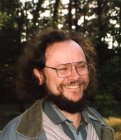|
Keynote Lecture
Learning data structures with inherent complex logic

Prof. Wlodzislaw Duch
Dept. of Informatics, Nicolaus Copernicus University
Torun, Poland
http://www.is.umk.pl/~duch/
Abstract: The greatest challenge for computational intelligence
is to learn in difficult, highly non-separable situations. Current
state-of-the-art learning algorithms are useful only when data is linearly
separable using appropriate kernels. Even simple problems with non-trivial
logic, like parity problems, cannot be learned with such algorithms. Many
problems in bioinformatics and text analysis require complex logic or
discovery of (approximate) logical structure in the data. Visualization of
learning dynamics in neural networks shows that frequently separability
cannot be achieved, but simpler goals for learning may be set. k-separability,
or the projection of data on a line and segmentation into intervals, is an
interesting concept that allows for estimation of the degree of non-separability.
Difficult problems may be learned in this way although quite different
algorithms are required.
Brief Biography of the Speaker:
Wlodzislaw Duch heads the Department of Informatics, Nicolaus Copernicus
University, Torun, Poland, and is a Visting Professor at Nanyang
Technological University, Singapore (2003-7). Ph.D. in quantum chemistry
(1980), postdoc at USC, Los Angeles (1980-82), D.Sc. in applied math (1987);
worked at University of Florida; Max-Planck-Institute, Munich, Germany,
Kyushu Institute of Technology, Meiji and Rikkyo University in Japan, and
several other institutions. He is on the editorial board of IEEE TNN, CPC,
NIP-LR, Journal of Mind and Behavior, and 7 other journals; co-founder &
scientific editor of the "Polish Cognitive Science" journal; president of
the European Neural Networks Society (2006-2008), member of IEEE NNS
Technical committee; expert of the European Union science programs;
published over 350 scientific and popular articles, 4 books, edited many
others, his DuchSoft company makes GhostMiner software package marketed by
Fujitsu. Expert in computational intelligence (CI), especially methods that
facilitate understanding of data, and algorithms inspired by models of brain
functions at different levels. Among other topics s on creation of general
CI theory based on similarity evaluation, meta-learning schemes that
automatically discover the best model for a given data, geometrical theories
for modeling of mental events and relating such models to neurodynamics, and
toys that facilitate mental development. With a wide background in many
branches of science and understanding of different cultures he bridges
various scientific communities. As a service to the international community
maintains many web pages related to CI, computational neuroscience, machine
learning and statistics. To access these pages and his full CV type "Duch"
in Google. |